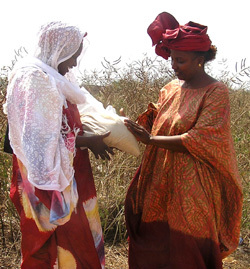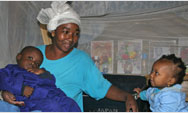You are here » Home » Telling Our Story
Success Story
Expanding the market for nutritional, resilient staple food
Women’s Co-op Sees Profits Soar

| |
Photo: USAID/Brook Johnson
|
|
Aya Ndiaye and Bineta Coly Gueye of Wula Nafaa examine the quality of a sack of fonio.
“Now everyone is starting to become interested in fonio.”
—Aya Ndiaye, president of Koba Club
|
Senegal is noted for sumptuous fish and meat sauces served on a bed of rice or millet, but a third staple seems poised to
take its place in Senegal’s cereal market.
Fonio (Digitaira exilis) is said to be Africa’s oldest cereal crop and is considered by the Mali’s Dogon people as the “seed of the universe.” When cooked it has the consistency of couscous, and it is rich in amino acids, easy to digest and low in natural sugars, making it an ideal food for the sick or diabetic.
Koba Club, a female-run business cooperative, has sold fonio for 20 years, but the market has always been limited. While fonio is easy to grow and well adapted to poor soils found in the region, its small seed size made processing extremely time consuming. It could take three hours and 15 liters of water to pound, winnow and wash four pounds of the grain. Until recently.
Inventor Sanousi Diakhité has developed a machine that can process 82 pounds of fonio in one hour. According to Sanousi, the machine removes the last roadblock to the fonio market.
USAID is now working with the Senegalese Ministry of Environment to help members of the Koba Club obtain fonio processing machines and remodel their workshops to improve efficiency, hygiene and quality. The program has also worked to stimulate national demand through a series of product demonstrations and partnerships with enterprises that market fonio.
As a result of these market and production developments in 2004, Koba Club increased its fonio revenues by 656 percent and was runner-up for the President’s Women’s Enterprise prize.
The tremendous success has improved the lives of Koba Club employees. Diaba Diallo used her profits from the fonio to buy a
bicycle so her daughter could go to high school. Fatou Ly used her profits to bring her son three hours from Kedougou to Tambacounda to treat a broken arm.
Koba Club has already financed 10 fonio producer groups and signed contracts with two producer networks for 10 tons of fonio in 2004–05.
Print-friendly version of this page (64kb - PDF)
Click here for high-res photo
Back to Top ^ | 

